As a previous undocumented person and the first generation to pursue higher education, I never thought I would have the honor and privilege to travel to Washington D.C., attend the ALA’s conference, and participate in the Pura Belpré Celebration and Noche de Cuentos. For more about me click here.
Duties and responsibilities: As a Social Media Liaison for SJSU REFORMA, I search for library resources and services that empower Latinx and Spanish-speaking communities. While searching, I noticed REFORMA National and REFORMA chapters re-posting 2021 Pura Belpré winners. The graphic included a link to a list of Latino/Latina writers and illustrators whose work best portrays, affirms, and celebrates the Latino cultural experience for children and youth. According to Hughes-Hassell (2011), “when children cannot identify with a book or see their lives celebrated through stories, it may have a negative impact on their self-image” (p.37). Learning about The Pura Belpré list was empowering. As I browsed the list, I noticed two of my favorite authors and illustrators, Yuyi Morales and Duncan Tonatiuh, whose books bridge the cultural divide between the Latino experience in Latina America.
Funding request: Dr. Michele Villagran and Rosa Rodriguez wrote a proposal to request funding for (Sarah, Guadalupe, and I) to attend the American Library Association National Conference. The proposal entailed that we would attend The Pura Belpré Celebration and Noche de Cuentos. First, help create an electronic flier. Second, take photos and video recordings of the activities. Third, help promote the content on social media. The purpose was to help REFORMA National reach a larger audience via social media. Dr. Linda Main Associate Director, Roffna Principle, and Ruth Huard Dean approved the proposal and provided the funding and opportunity for us to attend ALA’s conference.
ALA conference: The “Creating the Future Library Workforce: An Activist’s Agenda” was my favorite session. It dealt with understanding the people who lead libraries. Catherine L. Murray stated, “our future depends on creating and sustaining a diverse, action-oriented, technically proficient, and community-engaged workforce.” To eliminate barriers to entry, libraries should offer employees training and opportunities to continue their education. For example, pay workers the compensation they deserve, support their ideas and dreams, and trust them to make the library a welcoming place for all.
As I attended multiple sessions, I realized that libraries have difficulties hiring and retaining a diverse workforce. For example, libraries use outdated job descriptions that often confuse and prevent people from applying. The lack of cultural knowledge prevents libraries from retaining a diverse workforce. CQ knowledge helps librarians become aware of policies, procedures, and services that prevent multicultural communities’ access to information. Given that “failure to understand and respect cross-cultural differences invariably leads to personal and professional unfulfillment, an inability to build trust and achieve consensus, wasted time, missed business opportunities and loss of revenue (Van der Horst, 2018, p1).” For more information about CQ, I have included a video based on my understanding during INFO 281- Cultural competence for Information Professionals.
Exhibitors: Walking the exhibitors’ floor, I noticed the Lil Libros booth. They had bilingual children’s books celebrating Latin American culture and significant historical figures. As I browsed the book, I sparked a conversation with the salesperson. I told her I had met the author of Lil Libros at California State University Dominguez Hills (CSUDH) while pursuing my B.A. in Psychology. The author was promoting her books and offered to give me two of her books if I took photos and video during the conference because she was alone. The person looked at me in shock and said, “it was me” (Patty Rodriquez). I was astounded to see her. I thanked her for writing books that disrupt cultural deficit views and honor marginalized and underserved library patrons’ voices and life experiences. Lil Libros collection of books consists of El Chavo, Frida, La Catrina, etc.
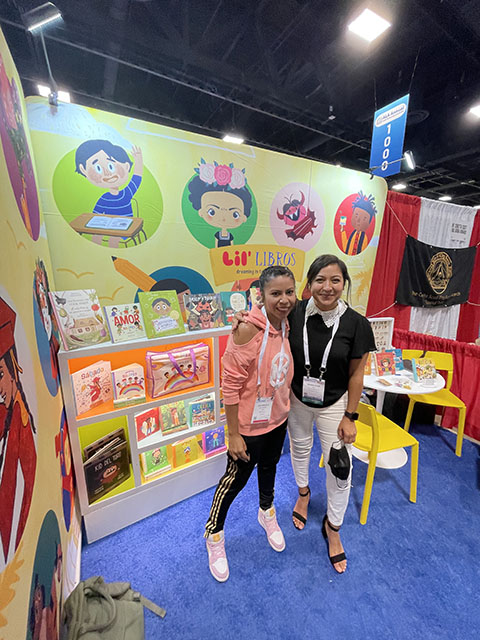
Roe v. Wade Protest
After the U.S. Supreme Court reversed Roe v. Wade, banning abortion rights, it led to many protests. Before walking to the Library of Congress, we (Sarah, Guadalupe, and I) attended the REFORMA Executive Committee meeting. During the meeting, we were informed that the protest could lead to the cancellation of Noche de Cuentos. Given that, Noche de Cuentos would be held at the Library of Congress next to the Supreme Court.
It was emotional to see how the ruling that had guaranteed abortion access nationwide for nearly 50 years had been overturned. I remember seeing a female holding a wire coat hanger symbolizing a dark era of abortion rights when abortion was illegal, and the option to terminate an unwanted pregnancy was unsafe. As we walked through the protest, I thought of my nieces, sisters, and friends; how this decision could prevent them from accessing medication, emergency contraception, and safeguard patient privacy.
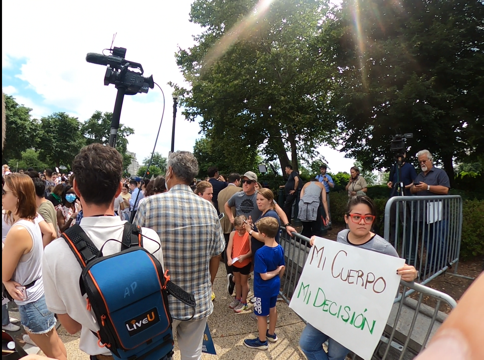
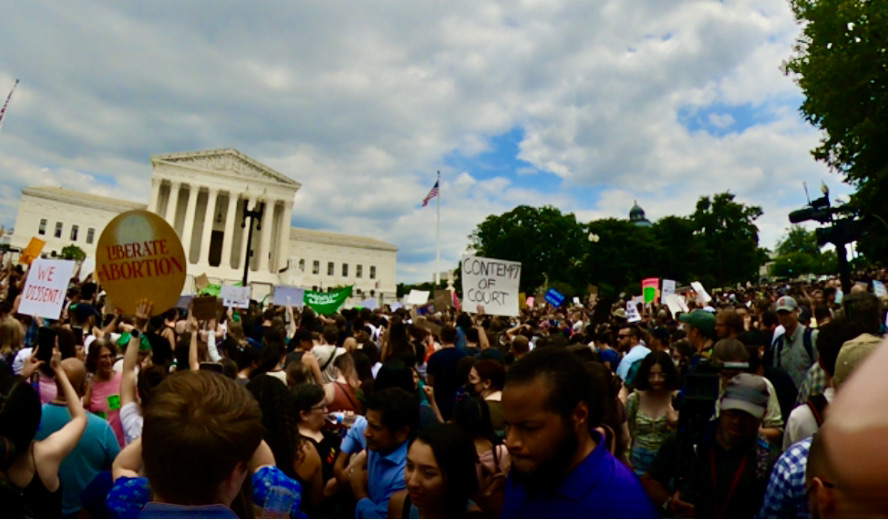
Library of Congress
After walking for a few miles as a group, we started the Noche de Cuentos celebration in the Hispanic Reading Room at the Library of Congress. The two storytellers were Meli Strova-Valencia and Jorge Tetl Argueta. I found it interesting how Meli used instruments and puppets for storytime. On the other hand, Jorge narrated his experience in El Salvador then read the book “Agua Aguita”. Both storytellers’ approaches were different but highly effective.
Learning about Náhuatl’s culture and how they view the world: Jorge stated that his grandma was an indigene; she was born in Náhuatl and spoke the: fire, wind, and the birth tongue. According to Jorge, the birth tongue is the language of Náhuatl. In the Náhuatl culture, water is life. Jorge recalls meeting a boy while hiking in San Salvador. The boy gave Jorge two bags of water. After drinking the water, Jorge felt terrible because he realized the boy did not have enough water, even for himself. Jorge tells the boy that he will be back to repay him (boy) for his good deed. A week later, Jorge returns to search for the boy, but no one in the town has seen or knows him. Jorge’s papá, an indigenous man and a firm believer in Mother Earth, told Jorge that the boy was a spirit of God.
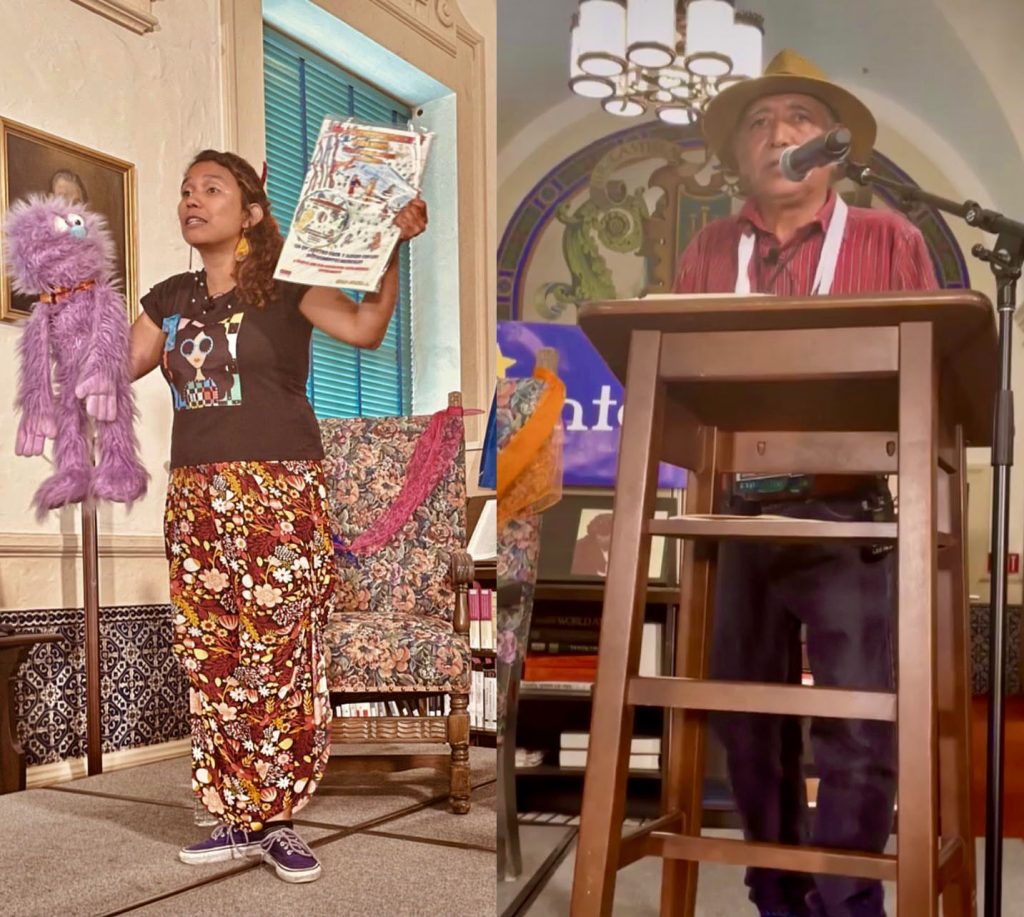
The Stunning Pura Belpré Celebration
Sarah, Guadalupe, and I were able to help with the decorations. I personally like Papel Picado. Papel Picado is a traditional Mexican decorative craft made by cutting elaborative designs into sheets of tissue paper. To ensure we captured every moment of the Pura Belpré Celebration, the three of us took photos, and video recorded the celebration. Sarah sat in front, and Guadalupe and I were on opposite sides of the ballroom. As the authors came in, I noticed the author and award-winning Yuyi Morales. I told her how her book Dreamers inspired me. In her book Dreamers, Yuyi Morales narrates how she and her son migrated to America and became caminantes/dreamers. During the celebration, we heard what inspired the authors to write their books. Lastly, the Pura Belpré Celebration ended with a Folklorico dance.
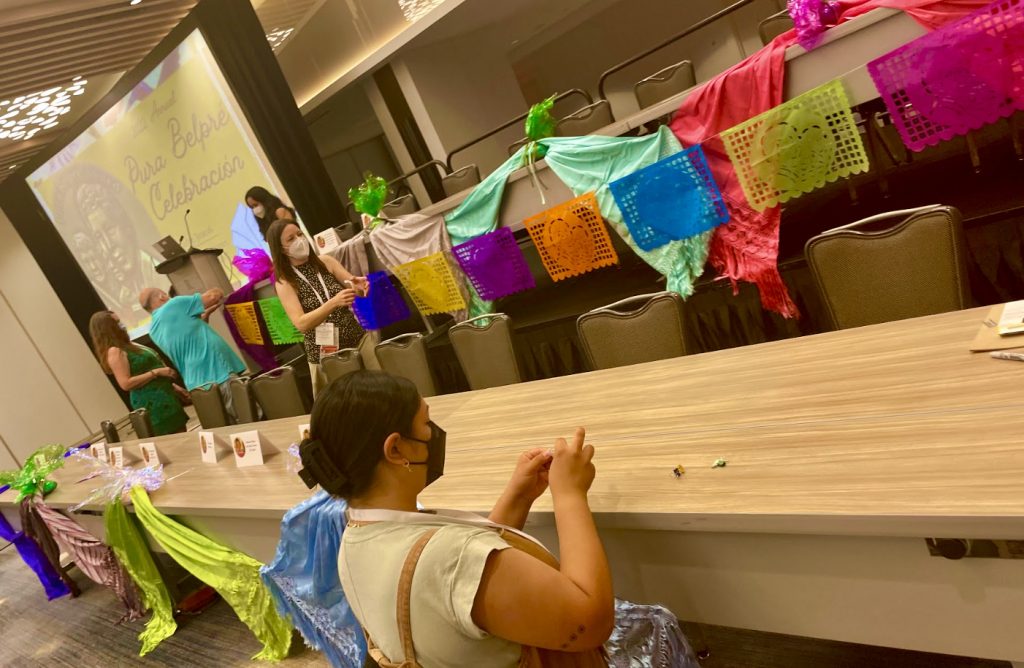
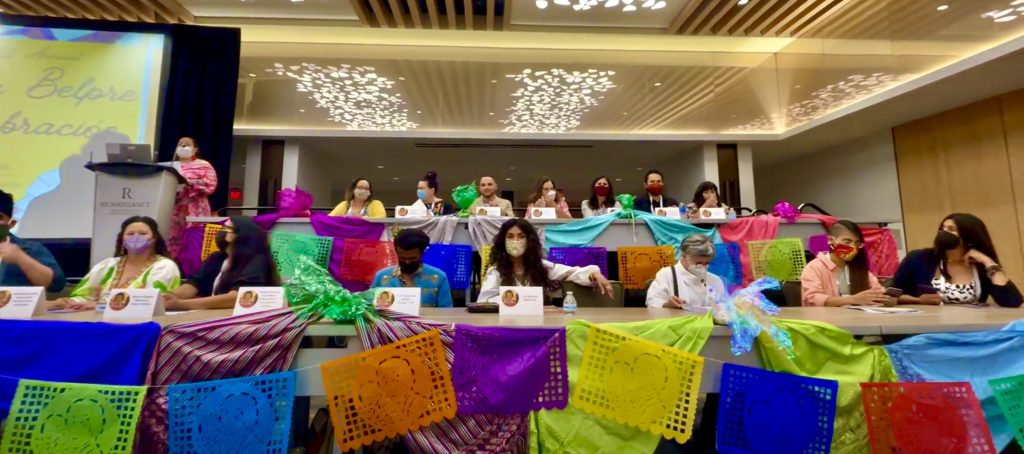
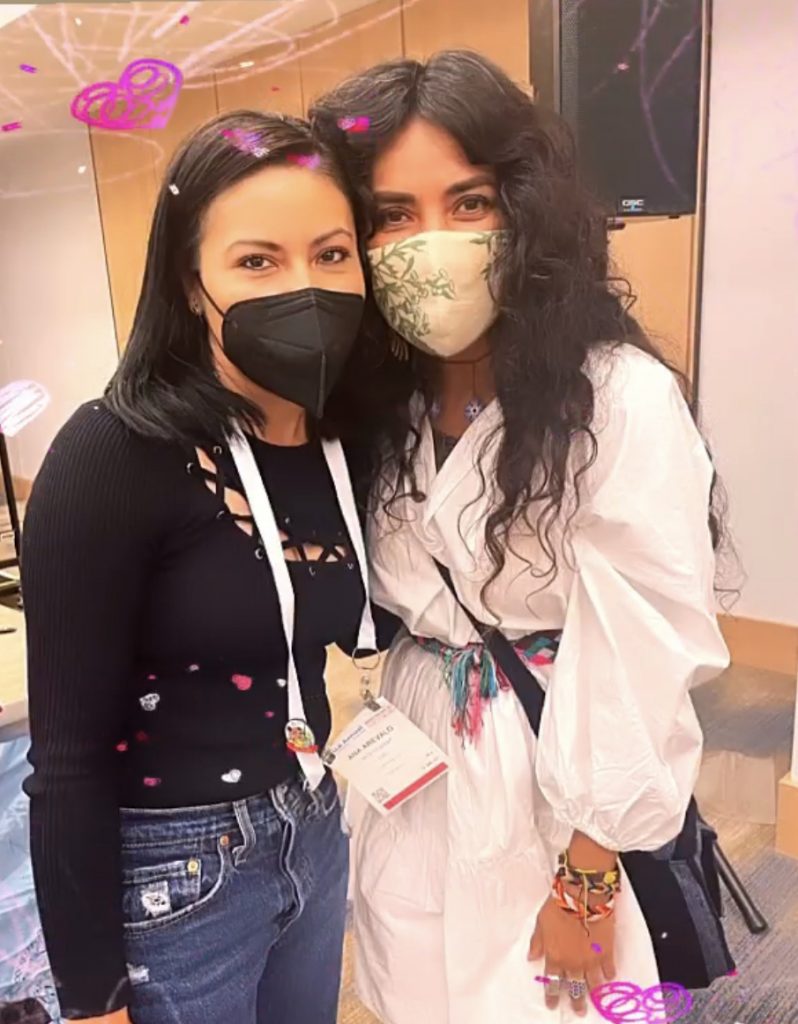
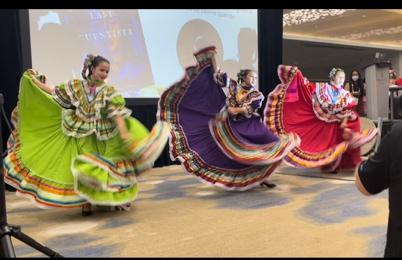
Book Signing
Book signing happened after the Pura Belpré Celebration. As I took pictures of award-winners, I approached Gloria Amescua. I told her that during my MILS program, I learned that language became the criteria for classifying individuals after the Mexican revolution. People were classified as indigenous or non-indigenous based on individuals’ ability to speak Spanish from Spain, which has caused the indigenous language to disappear in recent decades. I thanked Gloria for exposing mainstream society to the Nahua culture and traditions. Gloria signed and gave me her book Child of the Flower-Song People for free, illustrated by Duncan Tonatiuh. The book is a biography of an indigenous Nahua woman from Mexico who taught and preserved her people’s culture through modeling for famous artists.
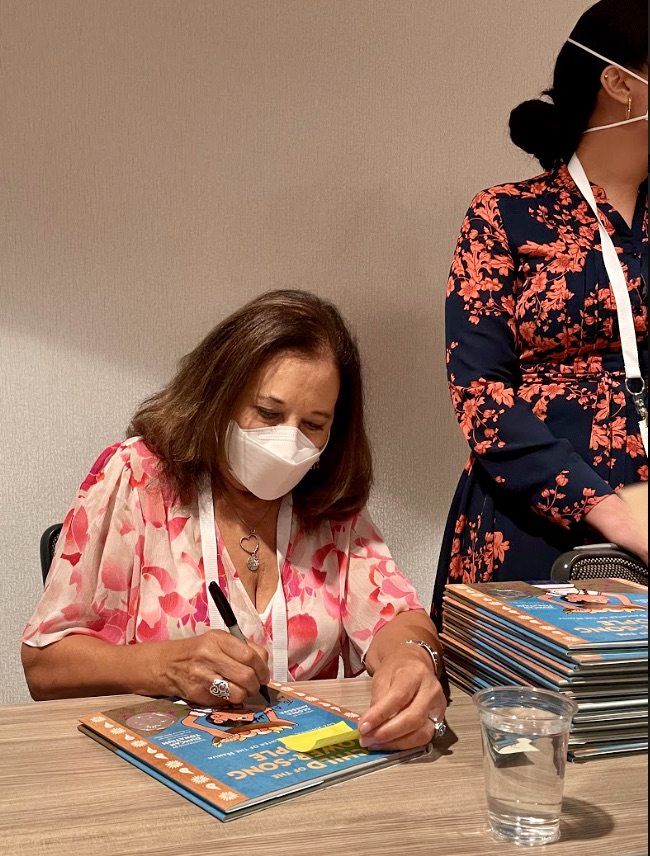
REFORMA Social Hour Meet and Greet
REFORMA Social Hour Meet and Greet is something that could not be missed. The meet and greet is an excellent way to socialize with other REFORMA members. I met many individuals from different backgrounds and experiences but with the same goal –to promote services to Latinx and Spanish Communities. Individuals shared their experiences and challenges working in libraries. The atmosphere in the room felt magnificent. People were welcoming, and they wanted to support and help others. During the Meet and Greet, I met a person currently working at the Los Angeles Public Library and CSULA. Nataly offered to guide and support me during the Librarian application process. She gave me her cell phone number and offered to meet with me when we were back in Los Angeles.
Library of Congress
One of the highlights of the trip was obtaining my library card from the Library of Congress. As I walked around the library, I noticed a sign that said: for users to access serviced areas, they are required to have a Reader Identification card; the card is free and can be obtained by completing a registration process which requires an identification card. Patrons can register in person at the Reader Registration Station or complete a simple computerized self-registration form. I quickly took out my phone and completed the self-registration. After completing the form, I walked to the Madison Building, RM 139, where library staff verified my information. They took an identification photo and asked for my digital signature; then, they provided me with a library card which I used the same day to go into the library’s research area and browse the library collection.
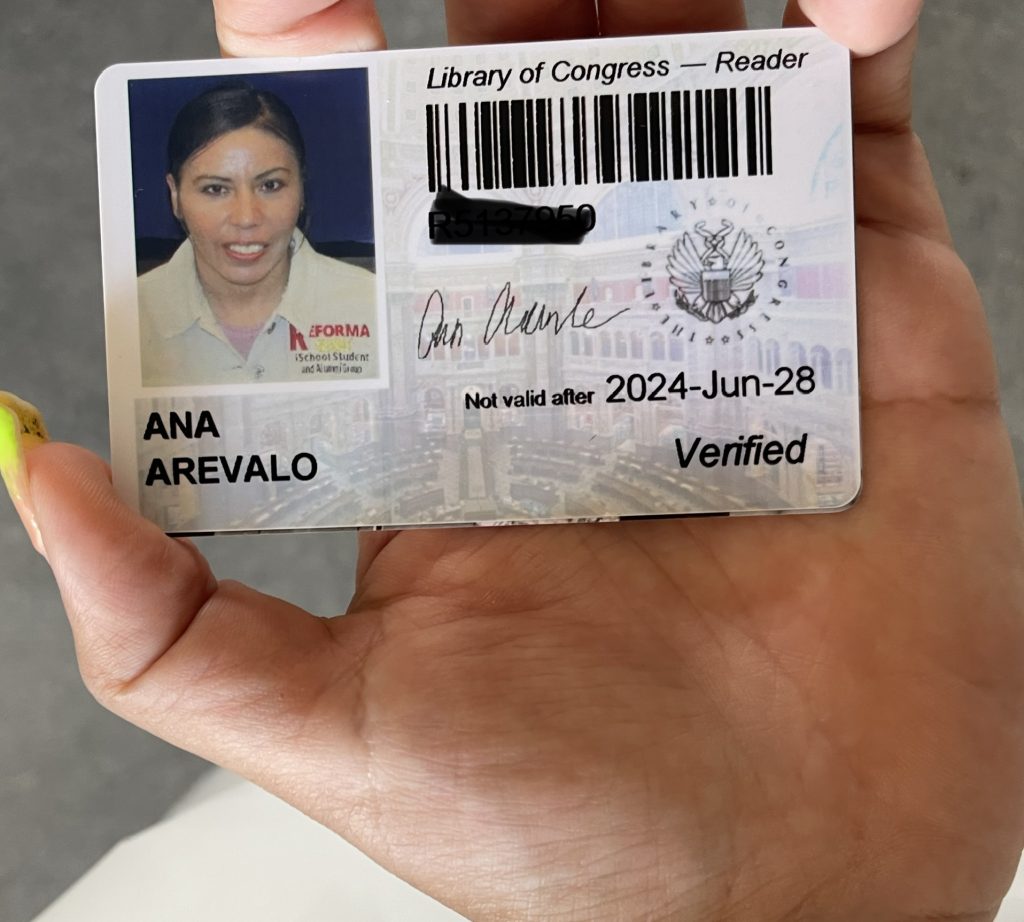

I recommend everyone to attend library conferences because you’re able to network, learn from other colleagues, learn new techniques, and find new resources to support your community.
References
Hughes-Hassell, Koehler, E., & Cox, E. J. (2011). Through their eyes: The development of self-concept in young African American children through board books. Children & Libraries., 9(2).
Van der Horst, C. A., & Albertyn, R. M. (2018). The importance of metacognition and the experiential learning process within a cultural intelligence-based approach to cross-cultural coaching. South African Journal of Human Resource Management, 16(1). https://doi.org/10.4102/sajhrm.v16i0.951
Ana Arevalo
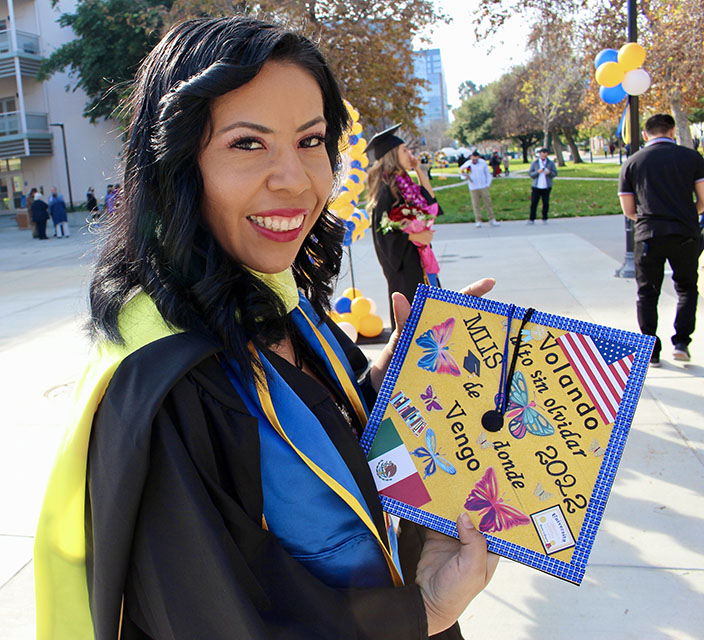
Ana Arevalo values outreach that works with at-risk youth. Ana’s biggest accomplishment has involved working with underserved communities. She has assisted and provided service to English language learners, children on the spectrum, and sexual abuse victims. In December of 2022, Ana earned a Master in Library and Information Science and plans to pursue a career in public librarianship. She has a Bachelor of Arts in Psychology from California State University Dominguez Hills. Ana also has an Associate in Arts in Spanish and Behavioral Modification. She is a member of Psi Chi International Honor Society. She served as Marketing & Social Media Liaison for REFORMA SJSU iSchool Student and Alumni Group and is part of REFORMA’s Los Angeles’s Chapter.
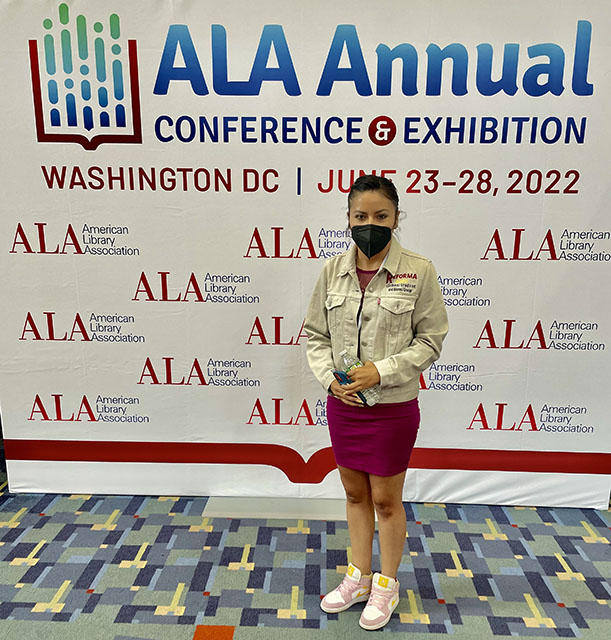
Leave a Reply